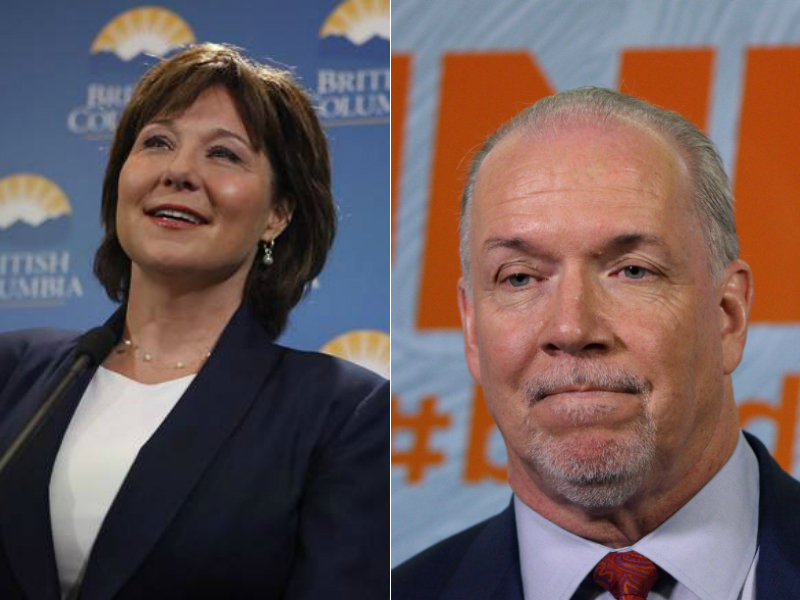With only a few months left to pump money into B.C.’s political parties, developers, unions and more pumped millions into the governing NDP and the opposition Liberals, according to data released by Elections BC on Monday.

The elections agency has released annual financial reports for 2017, which include data showing donations to parties after the May 9, 2017 election.
They also showed what donations looked like before new rules prohibiting corporate, union and organizational contributions came into effect on Nov. 30, 2017.
Coverage of B.C. political donations on Globalnews.ca:
The data shows $5,223,668.52 coming into the BC NDP from May 10 to Nov. 30.
Of that, more than $2 million came from corporations, with $100,000 donated by Alpenhaus Restaurants Ltd. alone.
The NDP also took in $1.52 million in union donations, with $100,000 coming from each of the the B.C. divisions of the Canadian Union of Public Employees (CUPE), CUPE National and the International Union of Operating Engineers Local 115.
Individuals, meanwhile, contributed just under $1.5 million to the party.
READ MORE: New York Times report on B.C.: Canada’s ‘Wild West’ of political cash
Meanwhile, the BC Liberals took in $4,231,810.74 in the same time period.

Get daily National news
Of that, more than $2.7 million came from corporations, with major contributions by Townline Homes ($100,000), Huamulan Developments Inc. ($93,000) and Wesgroup Properties Ltd. ($75,000).
Individuals contributed just under $1 million to the party, with major donations coming from Lululemon founder Dennis J. “Chip” Wilson ($100,000) and Townline Homes developer Rick Ilich ($75,000).
The BC Liberals also took in over $400,000 from unincorporated businesses and commercial organizations. That list included Aquilini Investment Group LP, whose principal officer was Canucks owner and developer Francesco Aquilini — his entity alone contributed $100,000.
An additional $121,560 came from “other” donors, a list that included organizations such as the Progressive Contractors Association of Canada ($13,700) and the Independent Contractors and Businesses Association ($4,000).
This chart compares donations to the BC NDP and the BC Liberals that happened between May 10 and Nov. 30:
A closer look at the data also shows how much developers dominated contributions over $10,000 in that time frame.
In a list of contributions over $10,000, developers kicked about $1.153 million to the BC Liberals, with contributions from companies such as Beedie Developments and the Macdonald Development Corp.
Meanwhile, slightly less than $500,000 of the contributions in this category went to the BC NDP, with major donations coming from Wesgroup, Bosa Properties and Concord Pacific Developments.
READ MORE: BC Liberals end ‘real-time’ reporting of political donations
But these numbers likely underestimate how much money developers gave to B.C. political parties.
IntegrityBC, a non-profit focused on accountability for political parties, said the BC NDP alone could have raised as much as $684,000 from developers after the election.
The latest data represents the last gasp of a time that earned B.C. a reputation as the “wild west” of political donations — from the New York Times, and others.
No longer can people write cheques to political parties totaling $100,000 — new rules limit individual contributions to $1,200.
And that’s a good thing, said Dermod Travis, executive director of IntegrityBC.
“The big money days of B.C. politics are over,” he told Global News.
“This was their last hurrah, some of the companies very clearly wanted to show their spirits for the last hurrah.”
READ MORE: BC NDP introduce legislation to ban big money in politics, includes corporate and union donation ban
The new rules are a positive development for two reasons, Travis said.
“One, it will get that sewer sense out of B.C. politics,” he said.
“And second, it’ll cause political parties to have to engage with the public more, and not hide behind handlers and photo opportunities.”
Travis noted that the political parties can’t use this money in any future campaigns — that they have to go to expenses such as operations or paying down debt.
You can look at the data yourself right here.














Comments
Want to discuss? Please read our Commenting Policy first.